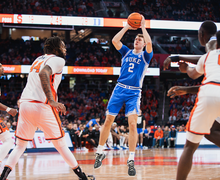Prioritize your mental and physical health during finals season
Wendy Wang | Asst. Photo Editor
If you regularly sleep, eat or exercise during finals season, you will have more productive study hours.
Every dollar donated during December will go directly toward paying students to produce stories like this one. Give now and ensure a brighter future for The Daily Orange.
As finals are approaching, many Syracuse University students are feeling stressed as the semester comes to an end. Finals week represents a long season of prolonged pressure and has apparent side effects such as heightened anxiety and depression. During finals season, many students push themselves to their absolute limit to get the best grades possible.
Stress can be a good thing. It can help you perform your best in a crunch. But it is important to remember that excess amounts of stress can lead to lasting health complications and could even inhibit your ability to succeed.
In a Boston University article, Lexington social worker Bonnie Jean Teitleman explained how stress can impact one’s physical health. “(Stress) triggers neuroendocrine activity and the release of hormones that increase heart rate and blood pressure and adversely impact other bodily functions,” she said.
To combat this stress, practice good eating, sleeping and exercising habits which will boost productivity and reduce stress during finals season.
Eating is vital — your body and brain need fuel to operate. Although it may be difficult to fit a meal into your schedule, have snacks available so you don’t have to pick between eating or studying during the build-up to finals. Even though late-night campus dining options are scarce, think ahead and pick up snacks and small meals from the Schine Student Center. You can also order from local restaurants or purchase reasonably priced meals from Good Uncle.
Exercise is great too, as your body releases stress-fighting endorphins that can boost your mood. The Barnes Center at The Arch is open until 11 p.m. and the Ernie Davis Fitness Center is open until 10 p.m. Even if you don’t have time to work out, make it a point to get up and to move; the blood flow to your brain alone boosts your mood and productivity. If you are studying in your dorm, try walking to Bird Library as a way to be active, even if it is just a short walk away.
Additionally, sleep is extremely crucial for your ability to retain information, making all your studying practically irrelevant if you neglect your “Z’s.” You need energy for your brain to work at full capacity, so shoot for a minimum of seven hours a night.
An ugly truth of finals week comes with the misuse of prescription drugs such as Adderall or Vyvanse. While the drugs may seem like a magic cure for the stress of finals, they should be regarded as dangerous to use if you are not prescribed to take it. At its worst, it is possible to overdose from the drugs, and a drug use study showed that drug misuse can lead to sleep difficulties, inability to concentrate and lack of motivation, among other things.
Caffeine can also be used as a tool to increase alertness and motivation, a helpful tool in moderation. But caffeine can cause increased blood pressure and heart rate, inability to fall asleep, irritability and digestive issues, all counterproductive to the aforementioned tips.
Research has proven that your body and mind work better when long tasks and study sessions are broken up into chunks. Try to take a 15-minute break for every hour of studying; try meditating, listening to music, taking a walk, eating or stretching. Do anything to give your brain a break.
Syracuse University psychology professor Jennifer Clarke gave important insights into keeping stress at a minimum. “One key to keeping stress low is preparation. Get organized for finals NOW. Start thinking about everything you need to complete between now and the end of the semester, and schedule reasonable amounts of time each day to work on each paper or project and study for each exam,” she said.
“Doing some of the work each day rather than procrastinating will likely both decrease stress and increase the quality of the work you do,” Clarke said.
Finals season results in so much unnecessary stress. While it is easier said than done, try to maintain perspective, a bad grade does not define anyone’s worth or intelligence, and it is by no means the end of the world.
I urge you to prioritize your physical and mental health in the upcoming weeks. We have been in school for most of our lives and are more or less self-aware of how we operate as individuals, and although it may seem better to study for an extra 30 minutes, you will be better off if you set that time aside to sleep, eat or exercise.
So good luck and happy grinding.
Nick Held is a sophomore undecided arts and sciences major. His column appears biweekly. He can be reached at ngheld@syr.edu.
Published on December 2, 2021 at 3:13 am





